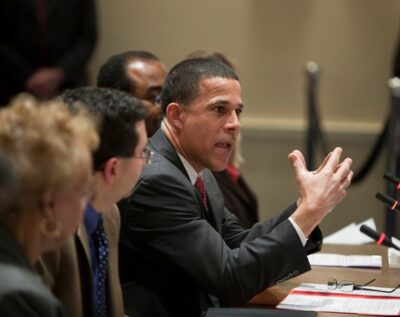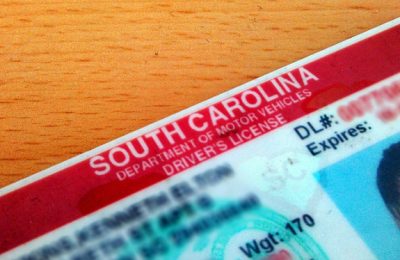State and Local

Alabama Ruling Yet Another Rebuke to State Immigration Laws
As with the Supreme Court’s recent opinion on Arizona SB 1070, initial media coverage portrayed the (technically) mixed rulings on the Alabama and Georgia immigration laws as a split decision. But do not be fooled: yesterday’s opinions from the U.S. Court of Appeals for the Eleventh Circuit represent a sweeping win for the immigrants’ rights movement and a crushing blow to the legal crusade led by Kris Kobach. While yesterday’s victory was not unqualified, the provisions struck down by the Eleventh Circuit were far more significant than those that were upheld. Read More

Can Deferred Action Beneficiaries Get Driver’s Licenses?
As the Deferred Action for Childhood Arrivals (DACA) initiative begins accepting applications this week, many are wondering whether beneficiaries of the program will be eligible to obtain a state driver’s license. At this point the answer is: it depends. Read More

States Apply Brakes on Immigration Legislation in 2012
The National Conference on State Legislatures (NCSL) released its annual review of immigration legislation moving in statehouses around the country. NCSL found a significant, 40% decrease in the introduction of immigration legislation and a 20% decrease in states enacting immigration-related laws when compared to 2011. This decline is the first in years, and is reportedly due to two factors: lawmakers being too busy dealing with budget issues and redistricting, and waiting to see how the Supreme Court would rule in Arizona v. United States. Read More

What the Show Me State Shows Us About Immigration
According to data released by the Immigration Policy Center, there are approximately 6,500 young people in Missouri who may benefit from President Obama’s plan to grant deferred action to DREAM eligible youth. This isn’t a huge amount in the grand scheme of things, as Missouri ranks 31st in the country with respect to the number of youth eligible for this new program. And because these numbers roughly parallel distribution of undocumented people around the country, if you are going solely by the numbers, Missouri shouldn’t be a big player in the debate over immigration, especially unauthorized immigration. But the numbers don’t tell the full story when it comes to the importance of the issue to the people of a state, and the importance of a state to the way the immigration debate plays out nationally. Looking at it from other perspectives, Missouri matters a lot. Read More

Lieutenant Governor Makes Plea for Maryland DREAM Act
At the end of its 2011 legislative session, Maryland lawmakers passed a bill that would allow certain undocumented students to pay in-state tuition rates at Maryland community colleges, joining 12 other states with similar laws. Now, however, opponents of the law have gathered enough signatures to suspend the law and force a referendum come November. Maryland’s Lieutenant Governor Anthony Brown, an advocate for affordable higher education, responded with a plea to voters to consider the contributions of these students and the value of education for all Maryland residents. Meanwhile, lawmakers in other states like Ohio and New Jersey are considering legislation that makes higher education more affordable to all its residents. Read More

New Injunction Sought in Challenge to Arizona SB 1070
Late Tuesday night, opponents of Arizona SB 1070 filed new papers in court seeking to block Section 2(B) from taking effect, arguing that state legislators were driven by anti-Latino bias and that the provision will inevitably result in constitutional violations. The motion, filed by civil rights groups, cited numerous previously undisclosed emails from former State Sen. Russell Pearce, the main sponsor of SB 1070, containing inflammatory comments about Mexico and unauthorized immigrants. The filing, submitted in federal district court in Phoenix, also sought an injunction against a separate provision of SB 1070 that attorneys argue is invalid under the Supreme Court’s recent decision in Arizona v. United States. Read More

Voter ID Laws Tackle Non-Existent Problem of Immigrant Vote Fraud
It is election season and voter-fraud hysteria is in the air. A raft of restrictive voter ID legislation from coast to coast is aimed primarily at one imaginary problem: fraudulent voting by immigrants who are not U.S. citizens. Supporters of these laws like to pretend that hordes of non-citizens are stampeding into voting booths and illegally changing the outcome of critical elections. But the reality is that voter ID laws have little to do with the exceedingly rare occurrence of illegal voting by immigrants, or any other kind of voter fraud. These are laws designed to disenfranchise racial and ethnic minorities, the poor, and other social groups that might be inclined to vote for the “wrong” candidates. In other words, voter ID laws are meant to limit democracy, not protect it. Read More

Some States Attempt to Move Forward on Immigration Laws Following Supreme Court Decision
Prior to the Supreme Court’s recent decision on Arizona SB 1070, other states that passed immigration laws were also embroiled in complicated legal battles. Alabama, Georgia, South Carolina, and Utah all passed restrictive immigration laws, parts of which were challenged in court and subsequently enjoined pending the Supreme Court’s ruling on Arizona. Now that the Supreme Court has ruled, however, each state is now attempting to interpret that ruling in an effort to implement its immigration law. Read More

Civil Rights Groups Resume Legal Challenges to Alabama’s Immigration Law
Less than three weeks after the Supreme Court’s landmark decision in Arizona v. United States—which struck down three provisions of SB 1070 and invited future challenges to a fourth—civil rights groups are back in court resuming their challenges to copycat laws in other states. Going forward, the lawsuits will focus more on how to interpret the Justices’ decision and less on theoretical legal questions about states’ rights. While the cases in Alabama and other states may take years to resolve, it is already clear that parts of the laws will be immediately struck down. Read More

In California, TRUST Act One Step Closer to Becoming Law
The California state Senate overwhelmingly approved the TRUST Act on Thursday, marking a significant step for a piece of legislation aimed at limiting the humanitarian impact of the Secure Communities program. The bill must still pass the state Assembly and be signed by Gov. Jerry Brown to become law, but its success thus far represents an important victory for the immigrants rights movement and has positioned California as the “anti-Arizona” among states frustrated with Washington’s failure to enact comprehensive immigration reform. Read More
Make a contribution
Make a direct impact on the lives of immigrants.
